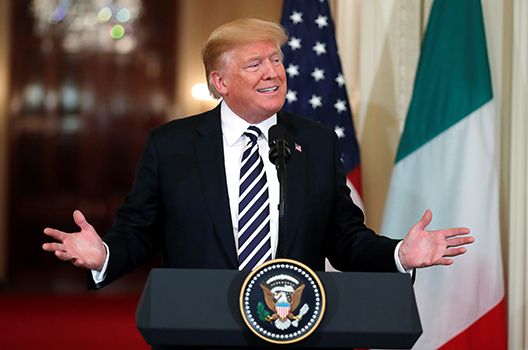 Eight days ago, US President Donald J. Trump warned Hassan Rouhani of dire “consequences” should the Iranian president persist with his threats against the United States.
Eight days ago, US President Donald J. Trump warned Hassan Rouhani of dire “consequences” should the Iranian president persist with his threats against the United States.
On July 30, Trump said he would be willing to meet with the Iranian leader at any time “with no preconditions.”
“If they [the Iranians] want to meet, we’ll meet,” Trump said at a joint press conference with Italian Prime Minister Giuseppe Conte at the White House in Washington.
Matthew Kroenig, deputy director of the Atlantic Council’s Scowcroft Center for Strategy and Security, said Trump’s willingness to meet the Iranian leader is “the textbook pressure and engagement strategy the United States has used for many years in dealing with rogue states.”
“Trump is increasing the economic and military pressure on Iran so long as it pursues its threatening nuclear and missile programs and support for terrorism while simultaneously holding out the promise of talks if Iran is willing to choose a more responsible path,” he said.
Barbara Slavin, director of the Atlantic Council’s Future of Iran Initiative, said: “In principle, such a meeting would be great, but I question whether the president is really willing— or able—to enter a negotiation with Iran in good faith after unilaterally withdrawing from the Iran nuclear deal and imposing a travel ban on visits here by most Iranians.”
Holly Dagres, a nonresident fellow at the Atlantic Council’s Scowcroft Center for Strategy and Security and editor the IranSource blog, agreed with Slavin, arguing that the Iranians “believe in a dialogue of mutual respect. Thus far, the Trump administration has proven to be an untrustworthy actor since they withdrew from the JCPOA [Joint Comprehensive Plan of Action].”
Read the rest on the New Atlanticist blog.
David A. Wemer is assistant director, editorial at the Atlantic Council. You can follow him on Twitter @DavidAWemer.
Image: U.S. President Donald Trump speaks during a joint news conference with Italy's Prime Minister Giuseppe Conte in the East Room of the White House in Washington, U.S., July 30, 2018. (REUTERS/Carlos Barria)
